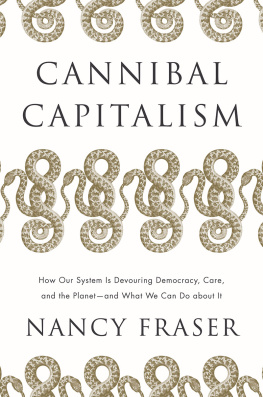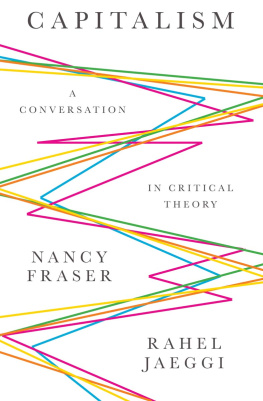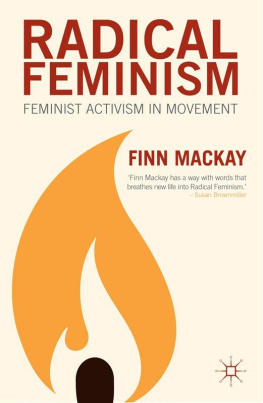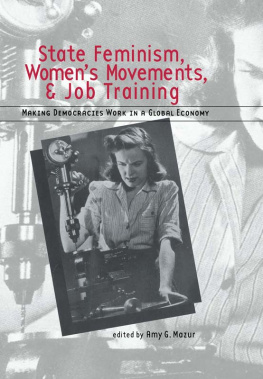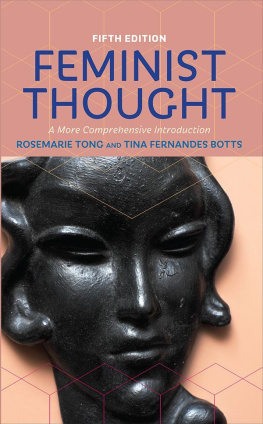
FORTUNES OF FEMINISM:
From State-Managed Capitalism to
Neoliberal Crisis

Nancy Fraser

For
Natasha Zaretsky
Kathleen Engst
Gina Engst
Three paths to a feminist future
Grateful recognition of institutional support and intellectual inspiration appears in the initial starred note of each chapter. Here I thank Tomer Zeigerman and Mine Yildirim for expert assistance in preparing the manuscript, and I acknowledge support from the New School for Social Research, the Stellenbosch Institute for Advanced Studies, the Einstein Foundation of the City of Berlin, and the Centre for Advanced Studies Justitia Amplificata.
I am grateful as well for permission to reprint the following chapters:
Chapter 1 was originally published in New German Critique 35, 1985. An earlier version of Chapter 2 appeared as Talking About Needs: Interpretive Contests as Political Conflicts in Welfare-State Societies, in Ethics 99:2, 1989. The version reprinted here appeared in Nancy Fraser, Justice Interruptus: Critical Reflections on the Postsocialist Condition , New York: Routledge, 1997. Chapter 3 was originally published in Signs: Journal of Women in Culture and Society 19:2, 1994. An earlier version of Chapter 4 appeared in Political Theory 22:4, 1994. The version reprinted here was subsequently published in Nancy Fraser, Justice Interruptus . An Earlier version of Chapter 5 appeared in Boundary 2 17:2, 1990. The version reprinted here was subsequently published in Nancy Fraser Justice Interruptus . Chapter 6 first appeared in French translation in Actuel Marx 30, 2001. Chapter 7 was originally published in New Left Review , I/228, 1998. Chapter 8 was originally published in New Left Review 36, 2005. Chapter 9 was originally published in New Left Review 56, 2009. Chapter 10 was originally published in French translation in Revue de lOFCE 114, 2010.
Contents
1. Whats Critical About Critical Theory?
The Case of Habermas and Gender
2. Struggle over Needs: Outline of a Socialist-Feminist
Critical Theory of Late-Capitalist Political Culture
3. A Genealogy of Dependency:
Tracing a Keyword of the US Welfare State
(coauthored with Linda Gordon)
4. After the Family Wage:
A Postindustrial Thought Experiment
5. Against Symbolicism:
The Uses and Abuses of Lacanianism for Feminist Politics
6. Feminist Politics in the Age of Recognition:
A Two-Dimensional Approach to Gender Justice
7. Heterosexism, Misrecognition, and Capitalism:
A Response to Judith Butler
10. Between Marketization and Social Protection:
Resolving the Feminist Ambivalence
From todays vantage point, the history of second-wave feminism appears as a drama in three acts. Emerging from the ferment surrounding the New Left, the movement for womens liberation began life as an insurrectionary force, which challenged male domination in state-organized capitalist societies of the postwar era. In Act One, feminists joined with other currents of radicalism to explode a social-democratic imaginary that had occulted gender injustice and technicized politics. Insisting that the personal is political, this movement exposed capitalisms deep androcentrism and sought to transform society root and branch. Later, however, as utopian energies began to decline, second-wave feminism was drawn into the orbit of identity politics. In Act Two, its transformative impulses were channeled into a new political imaginary that foregrounded difference. Turning from redistribution to recognition, the movement shifted its attention to cultural politics, just as a rising neoliberalism declared war on social equality. More recently, however, as neoliberalism has entered its current crisis, the urge to reinvent feminist radicalism may be reviving. In an Act Three that is still unfolding, we could see a reinvigorated feminism join other emancipatory forces aiming to subject runaway markets to democratic control. In that case, the movement would retrieve its insurrectionary spirit, while deepening its signature insights: its structural critique of capitalisms androcentrism, its systemic analysis of male domination, and its gender-sensitive revisions of democracy and justice.
Historians will eventually explain how neoliberalizing forces succeeded, for a time at least, in defusing the more radical currents of second-wave feminismand how (one hopes) a new insurrectionary upsurge managed to reanimate them. For critical theorists, however, there remains a prior task: to analyze alternative grammars of the feminist imaginary in order to assess their emancipatory potential. Here the goal is to ascertain which understandings of androcentrism and male domination, which interpretations of gender justice and sexual democracy, which conceptions of equality and difference are likely to be most fruitful for future engagements. Above all, which modes of feminist theorizing should be incorporated into the new political imaginaries now being invented by new generations for Act Three?
Though not written with this aim in mind, the essays collected here can nevertheless be read today as preliminary attempts at such a reckoning. Composed over the past twenty-five-plus years as interventions in theoretical debates, they document major shifts in the feminist imaginary since the 1970s. For this volume, I have grouped them in three parts, which correspond to the three acts of the drama I have just sketched. In Part I, I have included pieces that seek to marry a feminist sensibility to a New Left critique of the welfare state. Targeting not only the latters androcentrism, but also its bureaucratic organization and near-exclusive focus on distribution, these essays situate second-wave feminism in a broader field of democratizing, anti-capitalist struggles. Reflecting the historical shift from mainstream social democracy to the new social movements, they defend the latters expanded understanding of politics, even as they also criticize some influential ways of theorizing it. Part II charts subsequent alterations in the feminist imaginary. Noting the broader cultural shift from the politics of equality to the politics of identity, these chapters diagnose dilemmas facing feminist movements in a period of ascendant neoliberalism. Troubled by the relative neglect of political economy at the fin de sicle, they criticize the eclipse of struggles for redistribution by struggles for recognition, even as they also defend a non-identitarian version of the latter. Part III contemplates prospects for a revival of feminist radicalism in a time of neoliberal crisis. Advocating a post-Westphalian turn, the essays comprising this section situate struggles for womens emancipation in relation to two other sets of social forces: those bent on extending the sway of markets, on the one hand, and those seeking to defend society from them, on the other. Diagnosing a dangerous liaison between feminism and marketization, these essays urge feminists to break that unholy alliance and forge a principled new one, between emancipation and social protection.
In general, then, the concerns shaping the volumes organization are both systematic and historical. A record of one theorists ongoing efforts to track the movements trajectory, the book assesses feminisms current prospects and future possibilities. Let me elaborate.
When second-wave feminism first erupted on the world stage, the advanced capitalist states of Western Europe and North America were still enjoying the unprecedented wave of prosperity that followed World War II. Utilizing new tools of Keynesian economic steering, they had apparently learned to counteract business downturns and to guide national economic development so as to secure near full employment for men. Incorporating once unruly labor movements, the advanced capitalist countries had built more or less extensive welfare states and institutionalized national cross-class solidarity. To be sure, this historic class compromise rested on a series of gender and racial-ethnic exclusions, not to mention external neocolonial exploitation. But those potential fault lines tended to remain latent in a social-democratic imaginary that foregrounded class redistribution. The result was a prosperous North Atlantic belt of mass-consumption societies, which had apparently tamed social conflict.
Next page

